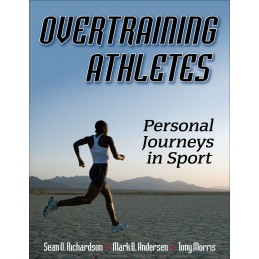- Reduced price

Order to parcel locker

easy pay


 Delivery policy
Delivery policy
Choose Paczkomat Inpost, Orlen Paczka, DHL, DPD or Poczta Polska. Click for more details
 Security policy
Security policy
Pay with a quick bank transfer, payment card or cash on delivery. Click for more details
 Return policy
Return policy
If you are a consumer, you can return the goods within 14 days. Click for more details
Overtraining Athletes:: Personal Journeys in Sport seeks to communicate the complex subject of overtraining to help athletes, coaches, parents, and sport science professionals understand the dangers of overtraining and take steps toward prevention. Using history and research, current experts perspectives, and athletes personal experiences, Overtraining Athletes identifies forces that push athletes to overtrain by sharing the struggles of those athletes and the sport professionals who seek to help them.
The text employs a nonlinear structure, allowing the flexibility to sample chapters from each of its four parts based on interest and level of knowledge about the topic. By presenting the phenomenon of overtraining from a variety of perspectives and with varying degrees of technicality, the book engages a wide range of readers while presenting significant research and studies in the area. Each of the four parts of the text displays a distinct method for discovering how overtraining affects athletes, coaches, parents, and professionals.
Part I begins with a review of research examining aspects of overtraining, including prevalence, physiological and psychological manifestations, and outcomes. It concludes by discussing risk factors that increase the probability of overtraining. In part II coaches and sport scientists views on overtraining risk factors are presented. The authors interviewed 14 experts from major sport organizations in Australia to glean their perspectives on the possible variables associated with overtraining. With the perspectives of these experts, readers may identify the characteristics, behaviors, and experiences of susceptible athletes, as well as the situations, factors, sport cultures, and people that both pressure athletes to increase their training and affect athletes needs for recovery.
In part III the focus turns to the experiences of the athletes. Drawing on interviews from 13 athletes with identified histories of chronic overtraining, the authors present three aggregate case studies::
-A professional footballer influenced by economic forces, internalized clich??Â??“d slogans, tough sport cultures, and traditional abusive practices
-A triathlete obsessed with the pursuit of the Olympic gold
-A young gymnast-turned-cyclist pressured by abusive coaches and an overinvolved parent
These three narratives, in addition to a description of Richardsons own overtraining experience, create a rich, detailed account of athletes struggles with overtraining. Part III concludes with observations and reflections on these four overtraining narratives to further explain how readers can learn from these athletes.
In part IV, the authors introduce a comprehensive model of overtraining risks and outcomes. This model is examined in relation to other overtraining models, thus accentuating its importance as a useful, fluid tool for identifying athletes who might be at risk as well as environments and cultures that increase vulnerability to overtraining. Part IV concludes with a discussion of future directions for research and professional practice and suggestions for further study.
Overtraining Athletes uncovers both the personal and interpersonal struggles encountered by athletes who overtrain. Its qualitative focus, current research, and future directions encourage readers to learn about the topic and take action in the treatment and prevention of overtraining. The authors hope the book will also encourage others to tell their stories, gather new data, and continue to unravel the question of why athletes become damaged through their participation in sport.
Data sheet
Part I: What We Know So Far
Chapter 1: Introduction to Research and Terminology in Overtraining
Perspectives on Telling Tales
Evolution and Changes in this Project
Sorting Out the Terms
Review of OT Terminology
Chapter 2: How Big Is It? Prevalence and Manifestation of Overtraining
Physiological Markers of Overtraining
Psychological Markers of Overtraining
Chapter 3: What Brings It On? Risk Factors for Overtraining
Risk Factors for Overtraining Based on Personal Experience
Summary of Risk Factor Research
Directions for Research on Overtraining Phenomena
Part II: What the Experts Have to Say
Chapter 4: Coaches and Sport Scientists Views on Risk Factors
Characteristics, Behaviors, and Experiences of Susceptible Athletes
Situations, Factors, and People That Pressure Athletes to Increase Training
Situations, Factors, and People That Affect Athletes Needs for Recovery
Chapter 5: Burnt Cookies: Conversations With an Exercise Physiologist
Studying Oneself
David Martin, PhD, Exercise Physiologist
Further Conversation With David Martin
Chapter 6: Sport Systems Can Damage: Conversations With a Sport Psychologist
Dr. Trisha Leahy
Canberra, 2001
Five Years Later in Hong Kong
Some Reflections on this Chapter
Part III: What We Can Learn from Athletes
Chapter 7: The Pathogenic World of Professional Sport: Steves Tale
Chapter 8: A Case of Olympic Seduction: Johns Tale
Chapter 9: The Perfect Girl: Janes Tale
Chapter 10: The Perfect Boy: The Authors Tale
Part IV: Past Models and Current Conceptions
Chapter 11: Models of Overtraining: Then and Now
Synthesis of Experts Perspectives and Athletes Experiences
The OT Risks and Outcomes Model
OT Risks and Outcomes Model Compared to Other Models
Afterword: Where to From Here?
Future Directions
Parting Glances
